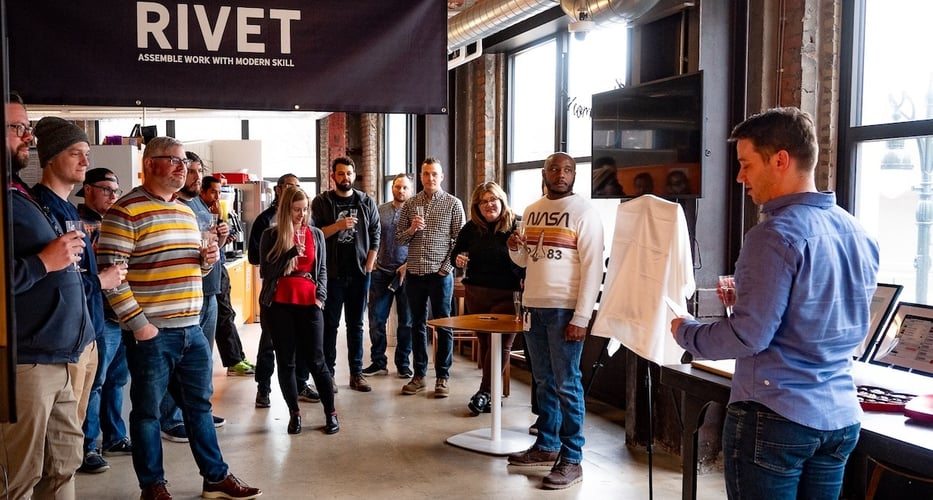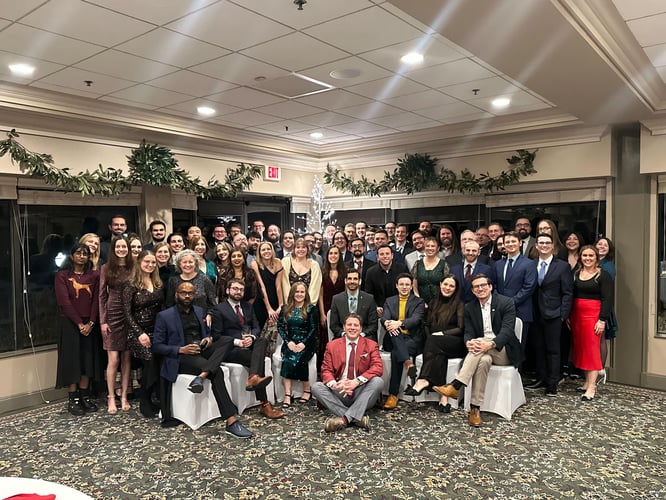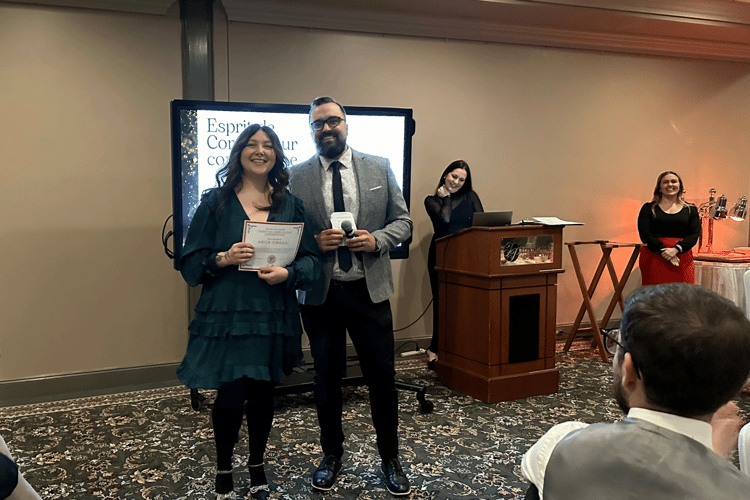Southeast Michigan’s industries are growing rapidly, creating a strong demand for skilled talent. According to the Michigan Bureau of Labor Market Information and Strategic Initiatives, employment in the state is projected to grow by 8.8% through 2030, with healthcare, engineering, and IT among the fastest-growing fields. Preparing tomorrow’s workforce takes more than just demand; it requires collaboration, innovation, and programs that connect education with real-world careers.
That’s where Ann Arbor SPARK comes in. As a driving force behind workforce development in the region, SPARK is helping young professionals explore career opportunities through hands-on training, strategic partnerships, and a community-centered approach that’s shaping the future of Southeast Michigan.
“We’ve always prioritized talent development,” said Phil Santer, Chief of Staff at Ann Arbor SPARK. “Our goal is to create meaningful opportunities for young people to thrive while driving growth for local businesses.”
.jpg?width=381&height=254&name=2017_manufacturing%20day%20(22).jpg)
.jpg?width=379&height=253&name=2017_manufacturing%20day%20(24).jpg)
Key Partnerships Driving Workforce Development
Workforce development is a collaborative effort, and SPARK’s strong partnerships with schools, community organizations, and employers are ensuring young talent is ready for Southeast Michigan’s future workforce needs.
Toyota, Washtenaw Community College, and the FAME Program
The Federation for Advanced Manufacturing Education (FAME) program, launched by a group of local employers, including Toyota and SPARK, offers students the opportunity to gain hands-on work experience while earning a degree at Washtenaw Community College (WCC). “SPARK has been pivotal in making this program a success,” said Meg Wallace from Toyota’s workforce team.
FAME goes beyond technical training—it helps students develop soft skills like communication and time management, which are highly valued by employers. Graduates leave the program with a mechatronics degree and real-world experience that sets them apart in the job market.
WCC plays a key role, offering technical education and career readiness support, including interview training to help students succeed. “WCC helps students prepare for success even before they enter the program,” Wallace added.
Driving Possibilities and STEM Awareness
Toyota’s Driving Possibilities initiative complements FAME by enhancing STEM education and career readiness in local school districts like Ypsilanti Community Schools and Lincoln Consolidated Schools. SPARK plays a key role in connecting these schools with employers and raising awareness about the opportunities available in fields like advanced manufacturing and engineering.
Washtenaw Intermediate School District (ISD)
SPARK works closely with Washtenaw ISD to enhance and expand hands-on applied and experiential learning opportunities, including Career Technical Education (CTE) programs, focused on career pathways including healthcare, technology, and manufacturing. By partnering with local employers, SPARK helps bring career exploration programs, industry site visits, and employer-led workshops into classrooms—bridging the gap between education and workforce expectations.
For example, local employers offer job shadowing, internships, and co-op placements, empowering students to apply their skills in professional settings. Ryan Rowe, Career Technical Education Director at WISD, praised SPARK’s leadership: “They bring everyone to the table — students, educators, and employers — to leverage collaborative solutions between education and industry to promote economic development”.
University of Michigan (U-M)
Headquartered in downtown Ann Arbor near the University of Michigan, SPARK collaborates closely with U-M to support research, innovation, and entrepreneurship. Through programs like the Michigan Translational Research and Commercialization (MTRAC) initiative, SPARK helps U-M researchers turn new technologies into real-world solutions, providing funding, mentorship, and business support to bring innovations to market.
SPARK also connects U-M students and alumni with internships, networking events, and startup opportunities, helping them gain hands-on experience and industry connections. Whether it’s supporting faculty-led startups or helping graduates find jobs in tech, mobility, and life sciences, SPARK plays a key role in keeping top talent in Southeast Michigan.
Michigan Works! Southeast
SPARK works with Michigan Works! Southeast to connect job seekers and employers, offering resources like career coaching, training, and job fairs. From assisting veterans through Michigan Department of Labor and Economic Opportunity's (LEO) Veteran’s Employment Services to collaborating with Michigan Rehabilitation Services to remove workplace barriers, Michigan Works! Southeast ensures all job seekers have access to meaningful opportunities.
Beyond job placement, Michigan Works! Southeast provides critical training and upskilling opportunities. Through career coaching, resume workshops, and interview preparation, they help job seekers build confidence and stand out in a competitive job market. Their on-the-job training (OJT) programs offer financial support to businesses hiring new employees, ensuring that workers receive the training they need to succeed long-term.
Additionally, tuition assistance programs and skills certification courses help job seekers break into high-demand fields like healthcare, IT, advanced manufacturing, and skilled trades—equipping them with the credentials to secure better-paying jobs.


SPARK’s Unique Role in Workforce Development
SPARK builds on its strong partnerships by creating programs that help students grow and businesses thrive. One standout initiative is the Digital Engagement Center, which connects Eastern Michigan University students studying social media marketing with startups that need digital expertise. Students gain hands-on experience, and startups get the support they need to grow — it’s a win-win.
Beyond that, SPARK understands the power of connections. From hosting networking events to running a curated job board, they make it easy for job seekers and employers to find each other. Whether you’re a student, startup founder, or established business, SPARK plays a key role in strengthening the region’s talent pipeline.
Why Workforce Development Matters
For SPARK and its partners, workforce development isn’t just about filling today’s jobs — it’s about building a sustainable pipeline for the future.
“Students need opportunities to test and refine their career interests,” Santer said. “Whether it’s through an internship, a co-op program, or hands-on training, these experiences are invaluable in helping them figure out what they want — and don’t want — to do.”
Ryan Rowe echoed this sentiment: “It’s critical that students have experiences that affirm their career interests while they’re still in high school. That way, they’re empowered to make informed decisions about their future.”
Looking Ahead: Opportunities in Southeast Michigan
With programs like FAME, Driving Possibilities, and other initiatives that Ann Arbor SPARK supports, Ann Arbor SPARK is creating a ripple effect that will last for years. These initiatives don’t just prepare students for the workforce—they create a cycle of opportunity.
As students gain hands-on experience and build connections, they graduate with the skills and confidence to step directly into high-demand jobs. In turn, local businesses benefit from a stronger talent pipeline, fueling economic growth and innovation.
And as these young professionals advance in their careers, many return as mentors, hiring managers, or even entrepreneurs, further investing in the community. It’s a continuous loop of learning, opportunity, and reinvestment—one that makes Southeast Michigan a thriving hub for talent and innovation.
“Without SPARK, so many of these programs wouldn’t exist,” said Meg Wallace of Toyota. “They’ve been the bridge that connects educators, employers, and students in a way that’s changing lives.”
Southeast Michigan proves that when communities invest in workforce development, the entire region thrives. With Ann Arbor SPARK leading the charge, today’s students and young professionals are becoming the next generation of innovators, entrepreneurs, and leaders—fueling the region’s long-term success.


.png?width=50&name=Erin%20Gregory%20(1).png)



